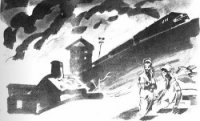A Death In The Family - Agee James (электронные книги без регистрации .TXT) 📗
But he had felt that although maybe she was proud of the name, he was not. How could you be proud of a name that everybody laughed at? Once when they were less noisy, and one of them said to him, quietly, "That's a nigger's name," he had tried to feel proud and had said, "It is not either, it's a very fine old name and I got it from my Great-granpa Lynch," they yelled, "Then your granpa's a nigger too," and ran off down the street yelling, "Rufus is a nigger, Rufus' granpa's a nigger, he's a ning-ger, he's a nin-ger," and he had yelled after them, "He is not, either, it's my great-granpa and he is not!"; but after that they sometimes opened a conversation by asking, "How's your nigger grandpaw?" and he had to try to explain all over again that it was his great-grandpa and he was not colored, but they never seemed to pay any attention.
He could not understand what amused them so much about this game, or why they should pretend to be all kindness and interest for the sake of deceiving him into doing something still again that he knew they knew better than to do, but it gradually became clear to him that no matter how much they pretended good, they always meant meanness, and that the only way to guard against this was never to believe them, and never to do what they asked him to. And so in time he found that no matter how nice they asked, he was not deceived by them and would not tell them his name, and this made him feel much better, except that now they seemed to have much less interest in him. He did not want them to go by without even looking at him, or just saying something mean or sneering as they passed, pretending so successfully that they meant to hit him with their books, that he had to duck; he only wanted them not to tease and fool him; he only wanted them to be nice to him and like him. And so he remained very ready to do whatever seemed necessary to be liked, except that one thing, telling his name, which was clearly not ever a good thing to do. And so, as long as they didn't ask him his name (and they soon knew that this joke was no good any more), he continued to hope against hope that in every other way, they were not trying to tease or fool him. Now they would come up to him looking quite serious, the older boys, and say, as if it were a very serious question, Rufus Rastus Johnson Brown What you gonna do when the rent comes roun?
He always felt that they were still teasing him about his name, when they said that; there was something about the word "Rastus" that they said in such a tone that he knew they disliked both names and held both in contempt, and he could not understand why they gave him so many names when only one was really his and his last name was really Follet. But at least they knew what his name was now, even if most of them pronounced it "Roofeass"; at least they weren't pretending they didn't know; it wasn't as bad as that. Besides, what they were really doing was asking him a question, "What you gonna do when the rent comes roun?" Though they asked it every time and it seemed a nonsensical question. They seemed to really want to know, and if he could answer them, then he could really tell them something they really didn't know and then maybe they would really like him and not tease him. Yet he realized that this too must be teasing. They did not really want to know. How could they, when the question had no meaning? What was the rent? What did it look like when it came roun? It probably looked very mean or maybe it looked nice but was mean when you got to know it. And what would you do when it came roun? What could you do if you didn't even know what it was? Or if it was just something they made up, that wasn't really alive, just a story? He wanted to ask what the rent was, but he suspected that that was exactly what they wanted him to ask, and that if or when he asked it, it would turn out that the whole thing was a trap of some kind, a joke, and that he had done something shameful or ridiculous in asking. So that was one thing he was now wise enough never to do: he never asked what the rent was, and this was one of the things he felt sure that somehow he had better not ask his mother or his father, either. So when they came up to him now, he always knew they were going to ask this foolish question, and when they asked it he felt stubborn and shy, determined not to ask what the rent was; and once they had asked it, and stood looking at him with a curious, cold look as if they were hungry, he looked back at them until he felt too embarrassed, and saw them start to smile in a way that might be mean or might possibly be friendly, and on the possibility that they were friendly, smiled unsurely too, and looked down at the pavement, and muttered, "I don't know"; which seemed to amuse them almost as much as when he had told what his name was, though not so loudly; and then sometimes he would walk away from them, and after a while he learned that he should not answer this question any more than he should answer the question about his name.
When he walked away, or when he refused to answer, he always realized that in some way he had defeated them, but he also always felt disconsolate and lonely, and sometimes because of this he would turn around after he had gone a little way, and look and they would come up and go round him again, and other times, when he kept on walking away, he felt even more lonely and unhappy, so much so that he went down between the houses into the back yard and stayed for a while because he felt uneasy about being seen, yet, by his mother. He began to anticipate going out to the corner with as much unhappiness as hope, and sometimes he did not go at all; but when he went again, after not going at all, he was asked where he had been and why he had not been there the day before, and he had not known what to answer, and had been much encouraged because they spoke in such a way that they really seemed to care where he had been. And within the next days things did seem to change. The older and more perceptive of the boys realized that the shape of the game had shifted and that if they were to count on him to be there, and to be such a fool as always before, they had to act much more friendly; and the more stupid boys, seeing how well this worked, imitated them as well as they could. Rufus quickly came to suspect the more flagrant exaggerations of friendliness, but the subtler boys found, to their intense delight, that if only they varied the surface, the bait, from time to time, they would almost always deceive him. He was ever so ready to oblige. How it got started none of them remembered or cared, but they all knew that if they kept at him enough he would sing them his song, and be fool enough to think they actually liked it. They would say, "Sing us a song, Roofeass," and he would look as if he knew they were teasing him and say, "Oh, you don't want to hear it."
And they would say that they sure did want to hear it, it was a real pretty song, better than they could sing, and they liked the way he danced when he sang it, too. And since they had very early learned to take pains to listen to the song with apparent respect and friendliness, he was very soon and easily persuaded. And so, feeling odd and foolish not because he felt they were really deceiving him or laughing at him, but only because with each public repetition of it he felt more silly, and less sure that it was really as pretty and enjoyable as he liked to think it was, he would give them one last anxious look, which always particularly tickled them, and would then raise his arms and turn round and round, singing, I'm a little busy bee, busy bee, busy bee, I'm a little busy bee, singing in the clover.
As he sang and danced he could hear through his own verses a few obscure, incredulous cackles, but nearly all of the faces which whirled past him, those of the older boys, were restrained, attentive and smiling, and this made up for the contempt he saw on the faces of the middle-sized boys; and when he had finished, and was catching his breath, these older boys would clap their hands in real approval, and say, "That's an awful pretty song, Rufus, where did you learn that song?"




